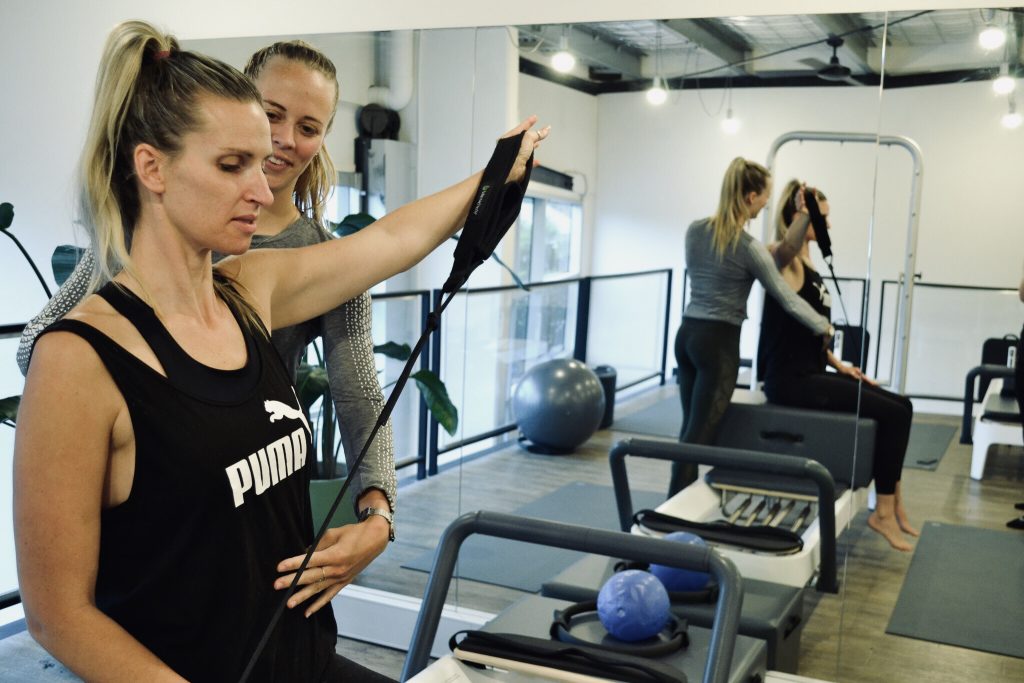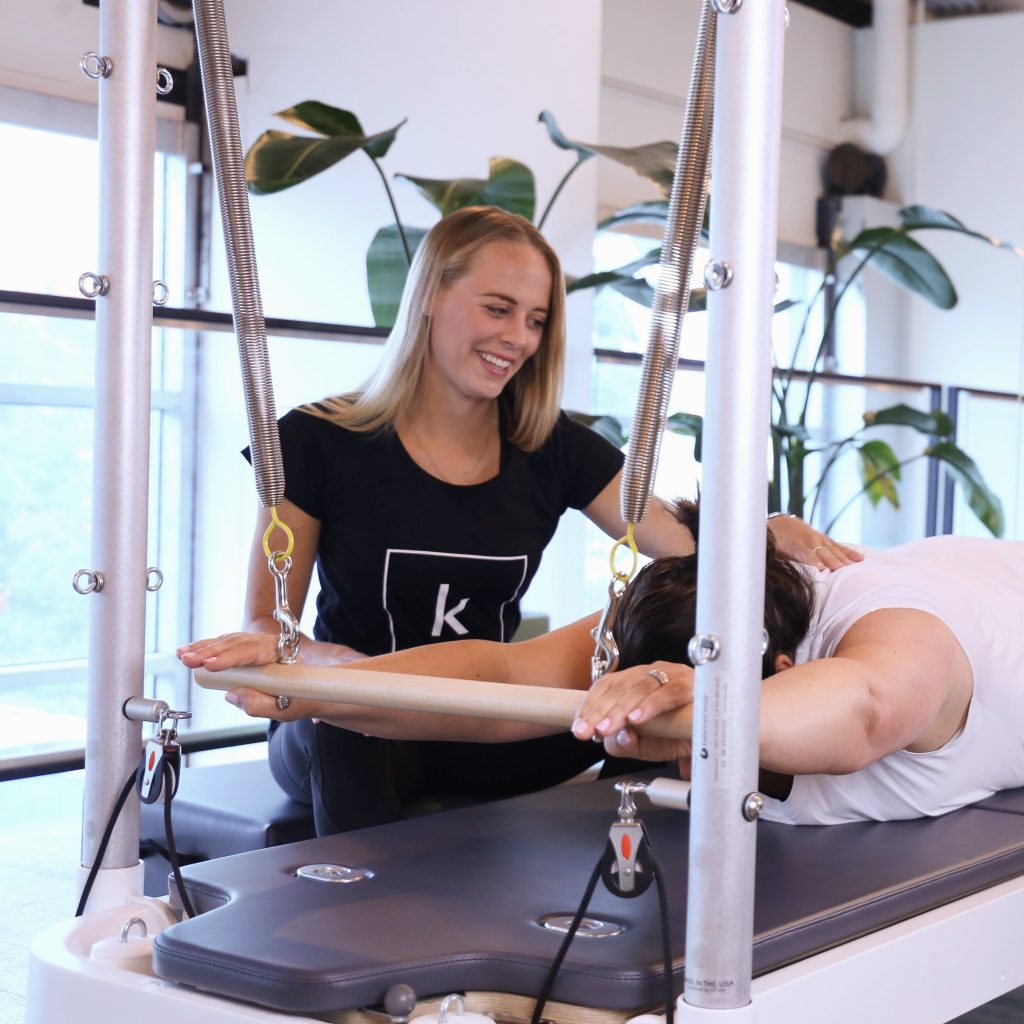Reformer or Clinical Pilates?
March 2ndWith so many different Pilates options available these days it can be hard to know which one to choose. In this blog, I share my personal experience with Pilates as well as how we run our sessions at Kinematics.

Flashback 9 years, I am a 15-year-old girl with aspirations of becoming a Division 1 Scholarship Swimmer. I have plateaued over the last 18 months and I’m desperate for a PB in order to grab the attention of colleges around the country. My mum drags me along with her to a Reformer Pilates class and my body is challenged in ways it has never been challenged before. Class sizes are relatively large (12-15 people per class) with little to no hands-on feedback provided. Nonetheless, I began attending classes 2x/week and I noticed significant improvements in my flexibility and overall ability to complete exercises in just a few weeks. Fast forward a year, and I set the state record in my best event and earned a full-ride scholarship to the University of Miami.
Initially, I thought Reformer Pilates was life changing and the reason for my improvements in the pool. But then I hit another plateau and couldn’t seem to make any further gains from Pilates classes as I had at first. It didn’t help that I paid very little attention to the advice from my physical therapist, who constantly told me I needed to improve my pelvic stability and if I didn’t, I would continue to put my body at risk of injury. This correlated to what the Pilates instructors would tell me to do through cueing, but I never understood what they meant and didn’t have the discipline at that age to care enough to correct my alignment. No instructor ever placed their hands on me during a class and showed me what a ‘neutral pelvis’ felt like. Looking back and knowing what I know now, even if I was doing relevant exercises, I likely never truly achieved the correct posture and therefore wasn’t getting the full benefit of my Pilates classes. Maybe if I’d been educated better I would’ve seen the further improvements I wanted to see and could’ve potentially prevented tearing my ACL just 4 months later.

So why is this relevant? What does this tell us about the importance of knowing the difference between Reformer Pilates + Clinical Pilates?
Pilates itself was developed in the 1920’s and is based around the 6 main principles: concentration, centering, control, precision, breathing and flow. Regardless of whether it is a ‘Reformer Pilates’ or a ‘Clinical Pilates’ session, the instructor delivery and studio setting ultimately determine your experience and what benefit is gained.
Reformer Pilates has recently been turned into a form of glorified exercise, losing sight of nearly all Pilates principles. We see gorgeous Instagram models posting videos and images doing what appear to be nearly impossible exercises on these Reformer machines that we have come to love so much. No matter how inspiring these exercises look, they provide very little explanation on the correct technique and their relevance to our everyday lives. If we aren’t ever educated and taught how an exercise is supposed to feel through hands-on facilitation from a trained practitioner, how do we know we are doing the exercise correctly? And even more importantly, how do we know we aren’t causing more harm than good to our bodies by doing irrelevant exercises with poor technique? Reformer Pilates may have been swept up in the worldwide growth of group fitness classes and gym workouts – but it is so much more!
I’m in no way saying there aren’t studios offering Reformer classes that are hugely beneficial and far more than a fitness craze! Reformer classes with high-quality trainers and smaller group sizes can still provide guided hands-on instruction to promote good technique and quality movement.
Through the years the Pilates Method has also evolved with the integration of clinical and biomechanical reasoning. Clinical Pilates is taught by a healthcare professional (e.g. Physiotherapist) with prior knowledge of anatomy and injury rehabilitation. Clinicians use the main Pilates principles and integrate them into an individualised exercise program specific to the needs of each client. After assessing and determining the main cause of a client’s issue, Pilates is used as a tool to improve movement patterns, optimise performance and limit the risk of injury.
In summary, failure to understand what type of Pilates your body needs can hinder your progress and in some cases result in even more pain and injury. Although exercises may seem similar between the different styles of Pilates, it is ultimately how they are administered and your individual needs that vary.

Pilates At Kinematics
Your pilates experience at Kinematics will ideally always start with an initial assessment with one of our Physiotherapists in order to get to know you and your body better. It involves a full-body screening and enables us to establish any areas of injury, imbalance or weakness to ensure you get the most out of your sessions. It is also an opportunity to introduce you to our pilates studio and discuss which pilates sessions are best suited to your body moving forwards.
We offer one-on-one sessions as well as small group clinical (1:4) and reformer (1:6) classes. Our one-on-one and clinical group classes are lead by our Physiotherapists and are rebateable with private health insurance. Exercises are individually tailored to your needs, goals and ability using a combination of reformer, tower and other equipment.
Our reformer classes are lead by registered pilates instructors and are limited to a maximum of 6 clients per instructor. These classes are carefully guided with varying levels of intensity and hands-on instruction ensuring correct technique at all times. Our classes have a strong focus on mobility, stability and postural strength and are suited to all levels of ability.
If you’re still unsure which of our Pilates services is right for you, give us a call on 03 9421 3661.
Pilates and Private Health Insurance
By now you may be aware that the Department of Health’s private health insurance reforms for natural therapies will take effect from 1 April 2019. This means private health insurance rebates will no longer be available for a number of natural therapies including Pilates.
The purpose of these reforms is to stop the allocation of extras cover to services that have no clear evidence in terms of their effectiveness, thereby removing costs from the system.
Because of its application in physiotherapy, the Australian Physiotherapy Association has worked hard to ensure that Pilates exercises led by Physiotherapists will continue to be supported by private health insurance. As such, Physiotherapists will be the only practitioners who will be eligible to deliver exercises drawn from Pilates within their scope of practice and be eligible for rebates.
However, if a physiotherapist (or any other health professional) conducts a Pilates session – either advertised or promoted as such, or a session where the only service provided is Pilates exercises – then benefits cannot lawfully be paid.
How will this affect Pilates services at Kinematics?
Clinical Pilates
In our 1:1 sessions and 1:4 group classes we will still provide individualised exercises focused on your goals and some of these may be delivered on Pilates equipment. To ensure you can still claim these classes under your extras cover, and ensure we comply with the reforms, these will now be called ‘Clinical Exercise Sessions‘. We will also continue to ensure initial one on one assessments are completed before you start group classes.
Reformer Pilates
**Please note, as at 1 July 2021 Kinematics is currently not offering 1:6 Reformer Pilates Classes, however we are still offering 1:4 Clinical Pilates classes
Our Reformer 1:6 Pilates classes will still be running and keep the same name. These classes are more about gaining mobility, preventing injury and maintaining physical health. Although an initial assessment is preferred, it is not required, and therefore clients won’t be able to claim these types of classes from 1 April 2019.
If you still have questions regarding the private health reforms and how they may impact you, please don’t hesitate to email info@kinematics.com.au or call 03 9421 3661. Visit website. Visit website. Visit website. Visit website.
